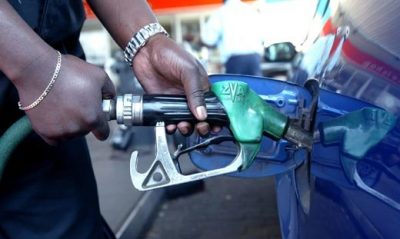A massive hike of 240 per cent in the prices of petrol and diesel goes into effect today in Zimbabwe.
Petrol was selling for 1.32 dollars (N481) per litre before Sunday’s hike. Now, it will be sold at $3.31 per litre.
However, its Nigeria counterpart has maintained (One hundred and forty five naira) 145 naira per litre since 2015, the administration of President Muhammadu Buhari took over from ex-president Goodluck Jonathan.
Though, Nigerians complain about the price, nipping their arguments on the country being among the tenth oil producing countries in the world. What would they say about Zimbabwe?
Zimbabwean President, Emmerson Mnangagwa who announced the increase on Saturday night, noted that the prices were predicated on the prevailing rate of 1:1 between the U.S. dollar and the surrogate bond note.
He said: “The government has today decided on the following corrective measures, with effect from midnight tonight, fuel pump price of $3.11 per litre for diesel and $3.31 for petrol will come into effect.” (In naira terms petrol is N1204 per litre and diesel N1135).
“Guests of government by way of foreign missions, other registered foreign bodies and tourists will fuel and refuel at designated points at the price of 1.24 U.S. dollars per litre for diesel and 1.32 U.S. dollars per litre for petrol upon production of proper identification documents,” Mnangagwa said.
The fuel price increases coincided with government’s decision that the country will have its own currency within 12 months, thus jettisoning the US dollar.
Zimbabwean Finance and Economic Development Minister Mthuli Ncube said adopting the U.S. dollar or the South African rand would not solve the country’s macro-economic problems.
Asked to give a timeline on when local currency would be reintroduced, Ncube said it would be done “in less than 12 months.”
He said separating the parity between Real Time Gross Settlement accounts (RTGS) and foreign currency accounts (FCA) was the beginning of currency reforms which are necessary for pushing the country’s economy in the right direction.
“Our job is to introduce a currency that will be stable and less volatile. Dealing with the fiscal side is the first order to move towards a stable currency,” Ncube said.
Zimbabwe adopted the use of multi-currencies in 2009 after its local currency had been rendered worthless by hyperinflation.
To relieve cash shortages, the Reserve Bank of Zimbabwe introduced the bond note in late 2016.
Initially pegged at 1:1 against the U.S. dollar when it was introduced, the bond note, however, has gradually lost value against the real currency and is now trading at about one-third the value of the U.S. dollar.


